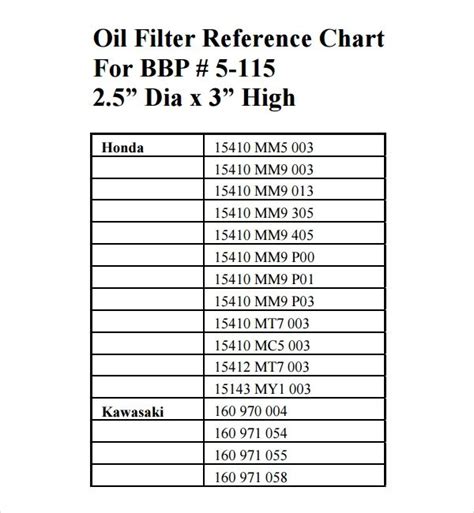How To Cross Reference Oil Filters
Ronan Farrow
Mar 31, 2025 · 3 min read

Table of Contents
How to Cross Reference Oil Filters: A Comprehensive Guide
Choosing the right oil filter is crucial for maintaining your vehicle's engine health. But with so many brands and part numbers available, finding the perfect match can be confusing. This guide will walk you through the process of cross-referencing oil filters, ensuring you select the correct one for your car, truck, or motorcycle.
Understanding Oil Filter Cross-Referencing
Oil filter cross-referencing involves finding equivalent filters from different manufacturers that fit your vehicle and meet its performance specifications. This means locating filters with the same size, thread pitch, and filter media type, even if the part numbers differ significantly. Why is this important? Sometimes your preferred brand isn't available, or you might find a better price on a different brand offering the same quality.
Why Cross-Referencing Matters:
- Cost Savings: Different brands offer varying price points for essentially the same product. Cross-referencing allows you to find the most cost-effective option without compromising quality.
- Availability: Your preferred brand might be out of stock. Cross-referencing provides alternatives to ensure you don't have to wait.
- Finding Superior Filters: Sometimes, a less-known brand offers a higher-quality filter than a more established name. Cross-referencing helps you discover these hidden gems.
Methods for Cross-Referencing Oil Filters
Several methods exist to effectively cross-reference oil filters. Let's explore the most common and reliable approaches.
1. Using Online Tools and Databases:
Many websites and online databases specialize in automotive parts cross-referencing. These tools often require you to input your vehicle's year, make, model, and engine type. The database will then provide a list of compatible oil filters from various manufacturers. Look for reputable sites with detailed specifications. Simply searching "[Your vehicle's make, model, year] oil filter cross-reference" on a search engine can yield helpful results.
2. Consulting a Parts Store or Mechanic:
Local auto parts stores and experienced mechanics are valuable resources. They usually have access to comprehensive databases and can assist you in finding suitable alternatives. Bring your old oil filter or your vehicle's information for a more accurate and efficient process.
3. Checking the Oil Filter's Packaging:
Believe it or not, some oil filter packaging includes a cross-reference chart. This chart lists the equivalent part numbers from other manufacturers. While not always present, it's worth checking if you have the original filter packaging.
4. Utilizing the Manufacturer's Website:
Some oil filter manufacturers offer online cross-referencing tools on their websites. This allows you to input a competitor's part number and find the equivalent from their product line.
Crucial Factors to Consider
When cross-referencing, don't solely focus on the part number. Pay close attention to these essential specifications:
- Filter Size and Dimensions: Ensure the physical size matches your vehicle's requirements. Incorrect sizing can lead to leaks or improper filtration.
- Thread Pitch and Type: The threads must align perfectly with your engine block. An incompatible thread can damage your engine.
- Filter Media: Different filter media offer varying filtration capabilities. Check for similar media types to ensure equivalent filtration performance.
- Bypass Valve: A functional bypass valve is essential to prevent engine damage during oil starvation. Confirm the bypass valve's presence and functionality in the cross-referenced filter.
Conclusion
Cross-referencing oil filters is a simple yet powerful technique for saving money and ensuring optimal engine performance. By utilizing the methods described above and paying close attention to the key specifications, you can confidently select the right oil filter for your vehicle, keeping your engine running smoothly for years to come. Remember, a correctly chosen oil filter is a vital component in maintaining engine health and longevity.
Featured Posts
Also read the following articles
| Article Title | Date |
|---|---|
| How To Fix A Aluminum Boat | Mar 31, 2025 |
| How To File Divorce Without A Lawyer | Mar 31, 2025 |
| How To Get Rid Of Big Headed Ants | Mar 31, 2025 |
| How To Get Rid Of Mice In A Chicken Coop | Mar 31, 2025 |
| How To Get To Jim Corbett | Mar 31, 2025 |
Latest Posts
-
Mother Half Pipe This Is How I Roll
Apr 03, 2025
-
Mommed Pregnancy Test How Early
Apr 03, 2025
-
Mary Oliver How I Go To The Woods
Apr 03, 2025
-
Macon Controls Thermostat How To Use
Apr 03, 2025
-
Lucid Boost Vape How To Turn On
Apr 03, 2025
Thank you for visiting our website which covers about How To Cross Reference Oil Filters . We hope the information provided has been useful to you. Feel free to contact us if you have any questions or need further assistance. See you next time and don't miss to bookmark.
